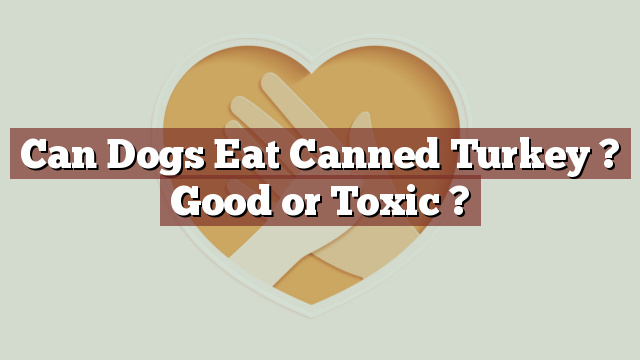Can Dogs Eat Canned Turkey? Good or Toxic?
As responsible pet owners, it is crucial to be aware of what foods are safe for our beloved dogs to consume. While dogs primarily thrive on a balanced diet of dog food, it is natural to wonder about the suitability of other human foods, such as canned turkey, for their diet. In this article, we will examine the nutritional value, potential risks, and expert insights regarding whether dogs can safely consume canned turkey.
Nutritional Value of Canned Turkey for Dogs: Analysis and Benefits
Canned turkey, like other forms of turkey meat, is rich in protein, which is essential for dogs’ growth, development, and overall well-being. Protein aids in the formation and repair of tissues, provides energy, and supports a healthy immune system. Additionally, turkey is a good source of vitamins and minerals, including vitamin B6, niacin, zinc, and selenium, which contribute to a dog’s optimal health.
Can Dogs Safely Consume Canned Turkey? Expert Insights and Advice
Can dogs eat canned turkey? Yes, dogs can safely consume canned turkey, providing it is prepared and served appropriately. However, it is crucial to note that there are certain considerations to keep in mind. While plain, cooked turkey is generally safe for dogs, it is important to ensure that the turkey is free from seasonings, spices, onions, garlic, and excessive salt, as these ingredients can be harmful to dogs. Moreover, the turkey should be properly cooked without any bones, which can pose a choking hazard or potentially cause internal blockages if ingested.
Veterinary experts emphasize moderation when feeding canned turkey to dogs. It should not be a regular part of their diet but rather an occasional treat or addition to their regular dog food. Dogs have different nutritional needs than humans, and it is crucial to maintain a balanced and complete diet for their overall health.
Potential Risks and Benefits of Feeding Canned Turkey to Dogs
Feeding canned turkey to dogs can have both risks and benefits. On the positive side, it can provide a source of lean protein, which promotes muscle development and repair. Additionally, the vitamins and minerals present in turkey can support a healthy immune system and contribute to a shiny coat and overall skin health.
However, it is important to note that certain risks may arise from feeding canned turkey to dogs. Seasonings, spices, and ingredients like onions and garlic can be toxic to dogs and should be avoided. Also, excessive consumption of turkey can lead to gastrointestinal upset, including diarrhea or vomiting. Moreover, bones present in canned turkey can splinter and cause serious internal injuries. Thus, it is essential to eliminate all bones from the turkey before serving it to your furry friend.
What to Do if Your Dog Eats Canned Turkey: Tips and Precautions
If your dog accidentally consumes canned turkey that contains harmful ingredients or bones, it is essential to take immediate action. Contact your veterinarian and provide them with detailed information about the situation. Follow their guidance on whether any further steps need to be taken, such as inducing vomiting or monitoring your dog for any adverse reactions.
To prevent such incidents, it is crucial to keep canned turkey and any other potentially harmful foods securely stored and out of your dog’s reach. Always supervise your dog during mealtime and ensure that they are only consuming foods that are safe for their consumption.
Conclusion: Understanding the Safest Approach for Feeding Canned Turkey to Dogs
In conclusion, dogs can eat canned turkey, but it must be prepared and served with caution. While it provides valuable protein and essential nutrients, it is important to avoid harmful ingredients, bones, excessive seasoning, and salt. Moderation is key, and canned turkey should only be an occasional addition to a dog’s diet. Consulting with a veterinarian is always recommended to ensure your dog’s specific dietary needs are met and to address any concerns or potential risks associated with feeding canned turkey. By adhering to these guidelines, you can safely share an occasional turkey treat with your furry companion while keeping them healthy and happy.
Thank you for investing your time in exploring [page_title] on Can-Eat.org. Our goal is to provide readers like you with thorough and reliable information about various dietary topics. Each article, including [page_title], stems from diligent research and a passion for understanding the nuances of our food choices. We believe that knowledge is a vital step towards making informed and healthy decisions. However, while "[page_title]" sheds light on its specific topic, it's crucial to remember that everyone's body reacts differently to foods and dietary changes. What might be beneficial for one person could have different effects on another. Before you consider integrating suggestions or insights from "[page_title]" into your diet, it's always wise to consult with a nutritionist or healthcare professional. Their specialized knowledge ensures that you're making choices best suited to your individual health needs. As you navigate [page_title], be mindful of potential allergies, intolerances, or unique dietary requirements you may have. No singular article can capture the vast diversity of human health, and individualized guidance is invaluable. The content provided in [page_title] serves as a general guide. It is not, by any means, a substitute for personalized medical or nutritional advice. Your health should always be the top priority, and professional guidance is the best path forward. In your journey towards a balanced and nutritious lifestyle, we hope that [page_title] serves as a helpful stepping stone. Remember, informed decisions lead to healthier outcomes. Thank you for trusting Can-Eat.org. Continue exploring, learning, and prioritizing your health. Cheers to a well-informed and healthier future!

